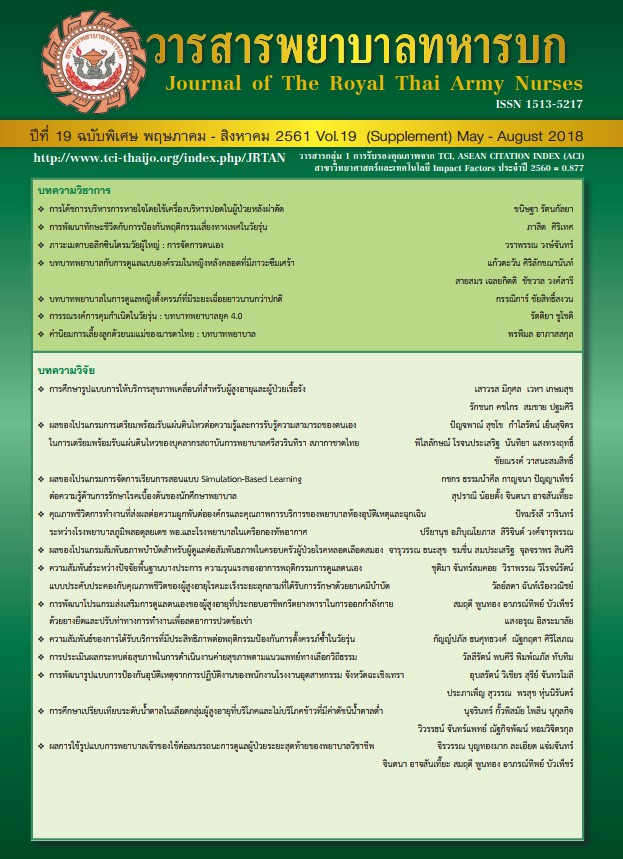Nurse’s Role in Holistic Caring for Maternal with Postpartum Depression
Keywords:
nurse’s role, holistic care, postpartum depression, maternalAbstract
Current situation of Thailand has finding the prevalence rate of Maternal with postpartum depression will be ongoing because the maternal with postpartum depression are related with teen age pregnant which is a national problem in Thailand. During postpartum depression, if promptly treated, it can return to normal. If there is a delay in medical treatment, the women may become depressed disorder and lead to suicide or mental illness. The literature review finding there are also many factors supporting this condition of postpartum depression. The Nurses are knowledgeable and skill-based professionals who reduce the incidence rate of postpartum depression in maternal. The application of 4 nurses’ role are; health prevention, helping the doctor Keep Healthy for maternal, Health promotion and rehabilitation. Therefore, this article focuses explain on postpartum depression in maternal caring by nurses’ role, holistic caring to their maternal. For nurses to understanding and to applying to caring their maternal with appropriate contextual.
Downloads
References
O’Hara MW, McCabe JE. Postpartum depression: current status and future directions. Annu Rev Clin Psychol. 2013;9:379-407.
Irma,N., Deoisres, w., and Hengudomsub, P. Postpartum Depression in Indonesian Mothers: Its Changes and Predicting Factors. Pacific Rim
International Journal of Nursing Research. 2018; 22 (2) : 93-105.
Junpoon, T., Yeekhien, C. The study of postpartum depression. Journal of Phrapokklao Nursing College. 2015; 26(1):64-74. (In Thai).
Sukkhasame,M. Predictors of Postpartum Depression. Journal of Nursing and Health Care.2016; 34.1: 47-55. (In Thai).
Poommanee, N. Depression after childbirth in adolescent mothers, hospital Sirindhorn Medical Burea [Thesis]. Bangkok: Chulalongkorn
University. 2014. (In Thai).
American Psychiatric Association. Depressive disorder. In: Diagnostic and statistical manual of mental disorder. 5th ed. Arlington, VA: American Psychiatric Association; 2013. p. 155-88.
Nuansawee, W., Kasiphon, T., and Natheethanasombut, K. The Prevalence of Postpartum Depression and Factors Predicting Depression
in Postpartum Mothers. HCU Academic Journal .2018; 21 (42): 65 -78. (In Thai).
Paulson, James F., and Sharnail D. Bazemore. Prenatal and postpartum depression in fathers and its association with maternal depression:
a meta-analysis. Jama. 2010; 303 (19 ):1961-1969.
Zadeh, M. A, Khajehei, M., Sharif , F., and Hadzic, M. High-risk pregnancy: effects on postpartum depression and anxiety. Br J Midwifery. 2012;
20(2): 105-13.
Brummelte, Susanne, and Liisa AM Galea. Postpartum depression: etiology, treatment and consequences for maternal care. Hormones and behavior. 2016; 77: 153-166.
Halter, Margaret Jordan, Donna Rolin-Kenny, and Faye Grund. DSM-5: Historical perspectives. Journal of psychosocial nursing and mental health services. 2013; 51(4) : 22-29.
Youngdee K, Roomruangwong C. Depression after childbirth among mothers with obstetric complications in King Chulalongkorn Memorial Hospital. Chula Med J. 2016 Sep – Oct;60(5): 561 – 74. (In Thai).
Prechon, K. Postpartum Depression: Prevention and Care. Thai Red Cross Nursing Journal. 2016; 9(2): 24-35. (In Thai).
Lotakul, M.,Sukhanich, P. Questionnaires were used to assess the severity of depression in patients. In Pattharayutawat, S. (Editor).
Psychological Measurement Handbook. 4th ed. Bangkok : Multimedia. 2008. (In Thai).
Ross, R., Wolf, L., Chiang-Hanisko, L., Tanaka, T., Takeo, K., Boonyanurak, P., et al. Predictors of depression among nursing students in four
countries: USA, Thailand, Taiwan, and Japan. Journal of The Royal Thai Army Nurses. 2014; 15(3): 195-201. (In Thai).
Department of Mental Health, Ministry of Public Health. Guidelines for managing depressive disorders for general practitioners in primary and secondary care. Thai Depression Center Phra Si Maha Pho Hospital Ubon Ratchathani. Siri Offset Printing Co., Ltd. 2011. (In Thai).
Jarassaeng, N., Arunponpaisa, S., Rungreangkulkij, S., Pimpanit, V., Maneeganondh, s., and Rodong, D. Effect of Psycho-education Program in Patients with Depressive Disorder. J Psychiatr Assoc Thailand . 2017; 62 (3): 247-255. (In Thai).
Downloads
Published
How to Cite
Issue
Section
License
บทความหรือข้อคิดเห็นใดใดที่ปรากฏในวารสารพยาบาลทหารบกเป็นวรรณกรรมของผู้เขียน ซึ่งบรรณาธิการหรือสมาคมพยาบาลทหารบก ไม่จำเป็นต้องเห็นด้วย
บทความที่ได้รับการตีพิมพ์เป็นลิขสิทธิ์ของวารสารพยาบาลทหารบก
The ideas and opinions expressed in the Journal of The Royal Thai Army Nurses are those of the authors and not necessarily those
of the editor or Royal Thai Army Nurses Association.






